|
|
|
Sort Order |
|
|
|
Items / Page
|
|
|
|
|
|
|
| Srl | Item |
| 1 |
ID:
187567
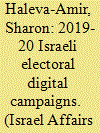

|
|
|
|
|
| Summary/Abstract |
This article focuses on the three Israeli digital campaigns during 2019–20 elections through their most prominent negative trends, namely: fake news, accounts and identities; politicians’ chat bots; influence and interruption networks, illegal information accumulation on Israeli citizens via social media and voting apps; anonymous and fake spam, and a complete lack of compliance with the statutory and regulatory framework. With technology’s speedy advancement, legal tools’ lagging, and political actors’ exploitation of the situation to their benefit, it seems that these campaigns, setting forth a fifth phase of political communication – Algorithmic Campaigns – constitute a rather bleak and grim future, as far as elections are concerned, thereby calling for rethinking.
|
|
|
|
|
|
|
|
|
|
|
|
|
|
|
|
| 2 |
ID:
185043
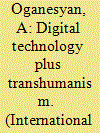

|
|
|
| 3 |
ID:
165333
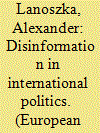

|
|
|
|
|
| Summary/Abstract |
Concerns over disinformation have intensified in recent years. Policymakers, pundits, and observers worry that countries like Russia are spreading false narratives and disseminating rumours in order to shape international opinion and, by extension, government policies to their liking. Despite the importance of this topic, mainstream theories in International Relations offer contradictory guidance on how to think about disinformation. I argue that disinformation is ineffective in terms of changing the policies of a target as regards to its foreign policy alignments and armaments – that is, the balance of power. To be strategically effective, disinformation must somehow overcome three powerful obstacles: first, the fundamental uncertainty that international anarchy generates over any information broadcasted by adversaries; second, the pre-existing prejudices of foreign policy elites and ordinary citizens; and third, the countermeasures that are available even amid political polarisation. I examine the most likely case of there seemingly being a conscious and effective strategy that emphasises disinformation: the Russian campaign that has targeted the Baltic states, especially since the 2014 annexation of Crimea. The available evidence strongly suggests that the strategic effects of disinformation are exaggerated.
|
|
|
|
|
|
|
|
|
|
|
|
|
|
|
|
| 4 |
ID:
182963
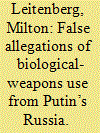

|
|
|
|
|
| Summary/Abstract |
From 1949 until 1988, the Soviet Union conducted a nearly continuous campaign of false allegations of biological-weapon (BW) use by the United States. In 1995, senior Russian military officials revived this pattern of false allegations, which continues to the present day. Russian officials amplified the campaign after the US government funded the transformation of former Soviet BW facilities in the Commonwealth of Independent States under the Nunn–Lugar program. The outbreak of the COVID-19 pandemic in China in January 2020 prompted a very greatly expanded Russian-government BW-related disinformation effort. This paper aims to present a reasonably comprehensive account of these activities and to assess their significance. The Russian government under President Vladimir Putin has demonstrated open disdain for both the Biological and Toxin Weapons Convention and the Chemical Weapons Convention.
|
|
|
|
|
|
|
|
|
|
|
|
|
|
|
|
| 5 |
ID:
161533
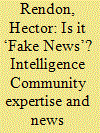

|
|
|
|
|
| Summary/Abstract |
Self-communication platforms have generated a myriad of outlets and news producers that represent a challenge for modern societies. Therefore, it is relevant to explore new measurements that can help understand whether a specific outlet disseminating news could be considered reliable or not. This study is based on the expertise from the U.S. Intelligence Community to offer a statistical model that replicates the reliability measurements based on intelligence expertise. The results suggest that a classification algorithm could be useful to measure news media reliability. Additionally, different variables were identified to predict perceptions of media reliability.
|
|
|
|
|
|
|
|
|
|
|
|
|
|
|
|
| 6 |
ID:
182909
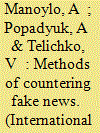

|
|
|
|
|
| Summary/Abstract |
FAKE news has become one of the most dangerous modern global phenomena. The 2016 presidential election campaign in the United States was a turning point in the perception of fake news: The publication and viral spread of disinformation nearly put an end to the rising political career of Donald Trump, who was forced to fiercely fight off lies coming from CNN and other media. Due to its unique ability to practically instantly capture large audiences and manipulate people's minds, fake news was put in the "absolute" weapons category [4]. In 2016, fake news triggered panic, and nobody knew how to thwart it [5] - there were no tested methods to counter it [6]. In modern information operations, fake news is a specialized tool for controlling people's minds and behavior...
|
|
|
|
|
|
|
|
|
|
|
|
|
|
|
|
| 7 |
ID:
182953
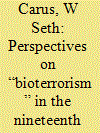

|
|
|
|
|
| Summary/Abstract |
The concept of “biological terrorism” predates the provenance of the term. Prominent anarchist intellectuals as well as sensationalist journalists alike promulgated the concept of deliberate disease during the last half of the nineteenth century. However, their published works do not reflect an accurate understanding of the biological sciences. In fact, the most accurate writings on disease as a weapon came not from anarchists or journalists, but from science-fiction writers.
|
|
|
|
|
|
|
|
|
|
|
|
|
|
|
|
| 8 |
ID:
158177
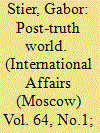

|
|
|
|
|
| Summary/Abstract |
FAKE NEWS played a very limited role in the presidential campaign in the United States that brought Donald Trump to the White House yet the despair of the Western liberal world attracted a lot of attention to this phenomenon.
|
|
|
|
|
|
|
|
|
|
|
|
|
|
|
|
| 9 |
ID:
184717
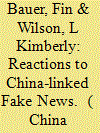

|
|
|
|
|
| Summary/Abstract |
China is accused of conducting disinformation campaigns on Taiwan's social media. Existing studies on foreign interventions in democratic societies predict that such disinformation campaigns should lead to increasing partisan polarization within Taiwan. We argue that a backlash effect, making Taiwan's citizens more united against China, is equally plausible. We conduct a survey experiment exposing participants to a real-life rumour and rebuttal to test these competing hypotheses. We find, at best, mixed evidence for polarization. Although neither rumour nor rebuttal mention China, there is consistent evidence of backlash against China. Most notably, participants across the political spectrum are more inclined to support Taiwanese independence after viewing the rumour rebuttal. These findings indicate that citizens may put aside partisanship when confronted with false news that is plausibly linked to an external actor. We conclude by discussing the broader applicability of our theory and implications for cross-Strait relations.
|
|
|
|
|
|
|
|
|
|
|
|
|
|
|
|
| 10 |
ID:
189205
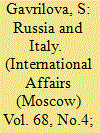

|
|
|
|
|
| Summary/Abstract |
RELATIONS between Russia and Italy depend on several factors - their extensive historical ties, intensive economic contacts, and similar positions on certain key issues of world politics. These issues include international security and the threat of terrorism, Italy's domestic political situation and position in the international arena, and the mutually favorable image of the two countries.
|
|
|
|
|
|
|
|
|
|
|
|
|
|
|
|
| 11 |
ID:
179943
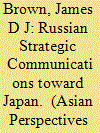

|
|
|
|
|
| Summary/Abstract |
Russia has been accused of weaponizing information to exert influence over the political systems and publics of countries in Europe and North America. However, is Moscow engaged in comparable activities in Japan? Given Japan's status as the United States' main ally in East Asia and the history of Soviet influence operations in the country, Japan is a logic target. Yet, to date, no detailed study has been conducted into Russia's use of information tools toward Japan. To fill this gap, in this article I examine Russia's contemporary strategic communications toward Japan in five areas: public diplomacy, Japanese mainstream media, Japanese social media, Russian state media in the Japanese language, and Russia's use of Japanese agents of influence. I also assess the extent to which these activities pose a threat to Japanese security by comparing Russia's activities via both a benign and malign model of strategic communications. This also facilitates comparisons with Russia's actions in other countries. Having identified contrasts in the approach taken by Russia toward Japan and Western states, the article concludes by discussing explanations for these differences.
|
|
|
|
|
|
|
|
|
|
|
|
|
|
|
|
| 12 |
ID:
176133
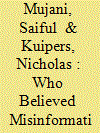

|
|
|
|
|
| Summary/Abstract |
We present findings from eight nationally representative surveys conducted during the 2019 Indonesian presidential campaign, in which we measured voters’ reported belief in prominent pieces of misinformation. Younger, better-educated, and wealthier voters were more likely to believe the misinformation. These results are true for stories about both the incumbent (Joko Widodo) and the challenger (Prabowo Subianto). These findings represent a significant departure from results in Western Europe and North America, where a surge in misinformation has disproportionately targeted older and less educated voters.
|
|
|
|
|
|
|
|
|
|
|
|
|
|
|
|
|
|
|
|
|